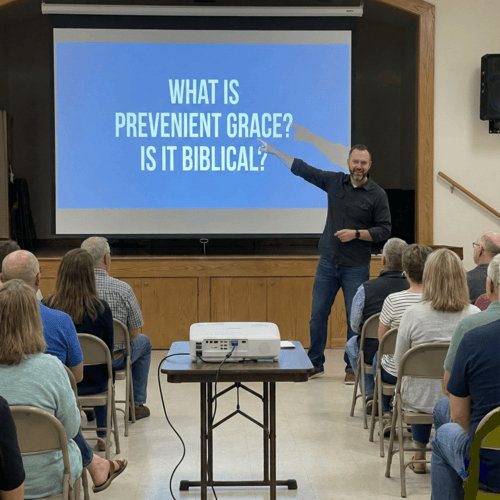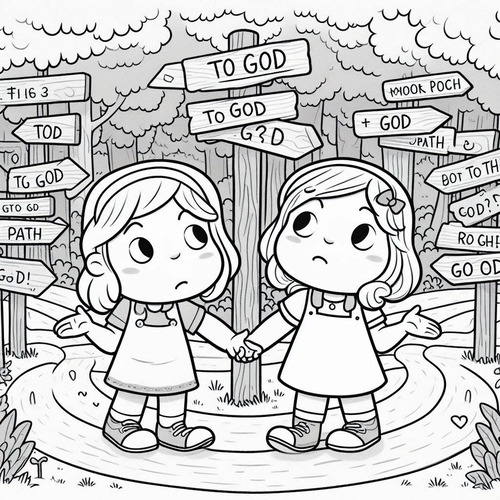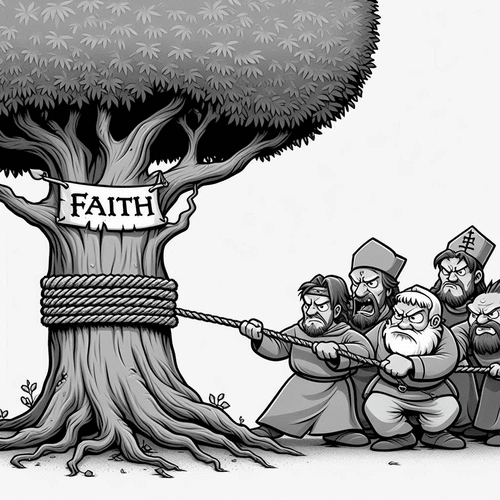Scientology vs Christianity: Conflicting Doctrines
The Church of Scientology, founded by L. Ron Hubbard in 1953, is a religious movement that has gained significant attention due to its unique beliefs and practices. The name “Scientology” is derived from the Latin “scientia,” meaning “knowledge or study,” and the Greek word “logos,” meaning “study of.” Hubbard aimed to create a “religion of the modern age” that promised spiritual enlightenment and self-knowledge through a systematic approach. In Scientology vs. Christianity: Conflicting Doctrines, we explore the core tenets of each faith, highlighting key areas of divergence.
Foundational Beliefs of Scientology
Scientology is based on the writings and teachings of L. Ron Hubbard, particularly his seminal work Dianetics: The Modern Science of Mental Health. Key concepts in Scientology include:
- Thetans and Spiritual Beings: Scientologists believe that humans are immortal spiritual beings called Thetans. Thetans are said to have lived through multiple past lives and have the potential for unlimited capabilities.
- Auditing and the E-Meter: Auditing is a core practice in Scientology, involving a counsellor (auditor) who uses an E-Meter, a device believed to measure the spiritual state of the person being audited. The goal is to clear individuals of negative experiences and traumas (called engrams) to achieve a state of “Clear.”
- The Bridge to Total Freedom: Scientology offers a structured path of spiritual development called the Bridge to Total Freedom. This consists of various levels of auditing and training, with the ultimate aim of reaching the state of Operating Thetan (OT), where one is believed to have total spiritual freedom and control.
- Self-Improvement and Ethics: Emphasis is placed on self-improvement, personal responsibility, and ethical behavior. Scientology’s ethical guidelines are intended to enhance one’s life and the lives of others.
Scientology vs. Christianity: Conflicting Doctrines
While Scientology presents itself as a spiritual path, its teachings and practices differ significantly from those of Christianity. Here are some key areas of divergence:
Nature of God:
- Scientology: The concept of God in Scientology is ambiguous. The religion does not provide a clear doctrine about God’s nature or existence, focusing instead on the self as the source of spiritual enlightenment.
- The Bible: Christianity is monotheistic, teaching that there is one God who is personal, omnipotent, omniscient, and omnipresent. God is the Creator of all things and is intimately involved in His creation (Genesis 1:1; Deuteronomy 6:4; Isaiah 45:5-6).
Human Nature and Salvation:
- Scientology: Humans are seen as inherently good spiritual beings (Thetans) who have accumulated negative experiences (engrams) over many lifetimes. Salvation is achieved through personal effort, auditing, and progressing up the Bridge to Total Freedom.
- The Bible: The Bible teaches that all humans are sinners by nature and are in need of redemption (Romans 3:23; Ephesians 2:1-3). Salvation is a gift from God through faith in Jesus Christ, not through human efforts (Ephesians 2:8-9; John 3:16).
Authority of Scripture:
- Scientology: Scientology’s teachings are based on the writings of L. Ron Hubbard, particularly “Dianetics.” These writings are considered authoritative within the Church of Scientology.
- The Bible: Christianity holds the Bible as the inspired Word of God and the ultimate authority in matters of faith and practice (2 Timothy 3:16-17; 2 Peter 1:20-21)
View of Jesus Christ:
- Scientology: Jesus is seen as one among many teachers who may have reached a high level of spiritual awareness. His role and significance are not central to Scientology’s beliefs.
- The Bible: Jesus Christ is the central figure of Christianity, believed to be the Son of God, the Savior of the world, and the only way to God (John 14:6; Acts 4:12). His death and resurrection are foundational to Christian faith (1 Corinthians 15:3-4).
Afterlife and Reincarnation:
- Scientology: Scientology believes in reincarnation, teaching that Thetans undergo multiple lifetimes and that spiritual advancement continues after physical death.
- The Bible: Christianity rejects reincarnation, teaching that humans live once, die, and then face judgment (Hebrews 9:27). The Bible promises eternal life with God for believers and eternal separation from God for unbelievers (John 3:16; Matthew 25:46).
Conclusion: The Church of Scientology presents itself as a religion offering a path to spiritual enlightenment and self-improvement. However, its teachings and practices significantly diverge from traditional Christian doctrines as outlined in the Bible. While Scientology focuses on personal effort and spiritual progression, Christianity emphasizes salvation as a gift from God through faith in Jesus Christ. The two belief systems differ in their views on God, human nature, the authority of scripture, the role of Jesus Christ, and the afterlife. It is essential for individuals to carefully examine and understand these fundamental differences before aligning themselves with any religious or spiritual belief system.
Related Reads
Editor's Pick

Prevenient Grace: 5 Reasons the Doctrine Fails
Can a spiritually dead person choose God? It’s one of the oldest questions in Christian theology. And how we answer [...]

Why Do People Hate the Doctrine of Election?
…WHEN THEY REALLY SHOULDN’T Few Bible doctrines provoke stronger reactions than election. The idea that God chose some for salvation [...]

The Doctrine of Providence: Does God Really Govern All Things?
You’re sitting in the doctor’s office when the diagnosis lands like a thunderclap. Your mind races: Why this? Why now? [...]
SUPPORT US:
Feel the Holy Spirit's gentle nudge to partner with us?
Donate Online:
Account Name: TRUTHS TO DIE FOR FOUNDATION
Account Number: 10243565459
Bank IFSC: IDFB0043391
Bank Name: IDFC FIRST BANK






